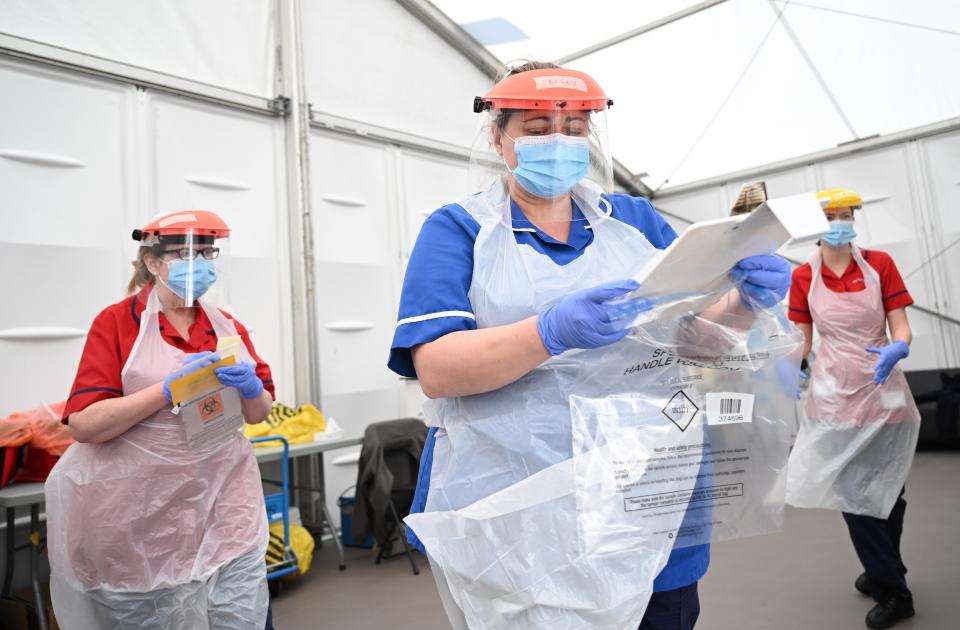As a doctor, the pay rise for NHS staff is a slap in the face given the sacrifices that have been made

NHS staff have had to face many obstacles over the last 12 months
(POOL/AFP via Getty Images)I didn’t join medicine for the money, in fact quite the opposite. But during the the past 10 years, junior doctors have faced pay cuts by as much as 30 per cent in real terms. During the same period, our honourable MPs have voted to give themselves no less than eight pay rises.
Most “junior doctors” earn less than tube drivers, self-employed plumbers and construction workers, among many others. Compared to professionals such as city bankers and lawyers, it the difference is even starker.
When you picture a junior doctor, you probably think of someone in the first year out of medical school. In reality it’s any doctor who’s not yet a GP or consultant, which takes years of work. Specialties such as psychiatry and surgery require a minimum of 8 to 10 years after graduating and passing annual assessments and exams.
For other specialities, it’s closer to 15 years, and many are still termed “junior doctors” into their late 30s and 40s – especially if training is done part time, or doctors change specialty.
A survey of members of the Royal College of Nursing (RCN) across the NHS and independent sectors – released in June last year – found that 36 per cent of respondents were thinking of leaving the profession. Of those thinking of leaving, 61 per cent cited pay as a factor. A different survey, released in December, found that 30 per cent of nurses asked planned on leaving the profession within 12 months thanks to the impact of the Covid-19 pandemic. Many had visited food banks, while 39 per cent had skipped meals to feed their family or save money.
The RCN has set up a £35m industrial action fund to support its members through a loss of earning should they decide to strike over this. NHS staff generally don’t like talking about money, but a 1 per cent pay increase for NHS staff is pretty appalling when you consider this actually means a real-terms rise of potentially just £3.50 a week.
Almost all the medics I know in the UK say they wouldn’t recommend the profession to their children. Yet, in countries where doctors are paid better – being a doctor is still something to aspire to. The NHS hospitals, mental health services and community providers are currently faces a shortfall of 84,000 full-time equivalent (FTE ) staff.
Burnt out frontline workers are retiring early, going off sick, or emigrating to countries where they will enjoy a better quality of life. My cousin, who is also a junior doctor, earns almost 600 per cent of my salary in another country. We graduated the same year and work the same hours.
It’s time to recognise and value the contribution made by NHS staff. Between March and December last year, more than 850 health and social care workers died of Covid-19 in England and Wales, yet staff continue to do their jobs to the best of their ability.
In recognition of the efforts of thousands of migrant workers within the NHS, The Doctors’ Association UK today launched “Overseas NHS Workers Day”, to celebrate the contributions of those who have propped up our health service during the pandemic, and to raise awareness of the issues they face.
Fairer pay for all NHS staff would be a starting point in view of the sacrifice made by so many during the pandemic.
The author is using a pseudonym. He is a GP trainee
Read More
British public urged to back mass slow handclap over 1% pay rise for NHS staff
NHS pay rise: Nursing union sets up £35 million industrial action fund amid mounting anger
Hugh Laurie leads celebrity backlash to ‘pitiful’ 1% NHS pay rise: ‘This will not do’

 Yahoo Finance
Yahoo Finance 